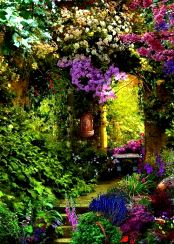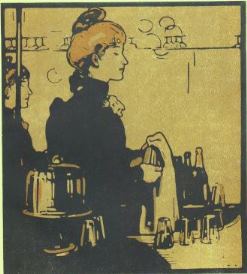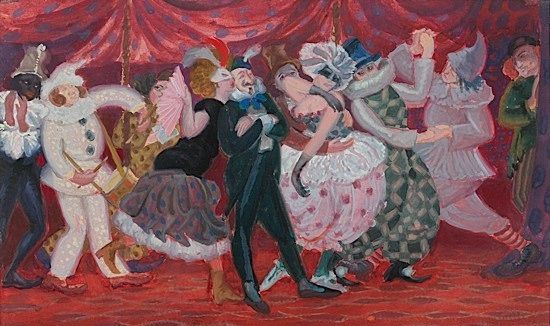
by NONA BLYTH CLOUD
In Georgette Heyer’s novel Regency Buck, Mrs. Scattergood’s description of herself fits my first impression of Edith Sitwell (1887-1964) perfectly: “I am shockingly expensive, but you won’t mind that, I daresay. Oh, you are looking at my gown and thinking what a very odd appearance I present. You see, I am not pretty, not in the least, never was, and so I have to be odd. Nothing for it! It answers delightfully.”
Edith Sitwell, her clothes and her poetry were meant to be controversial. Even now, photographs of Sitwell in her costumes easily rival Lady Gaga’s early dress-to-shock style. Irish novelist Elizabeth Bowen likened her to “a high altar on the move.”

Edith Sitwell, in a less flamboyant outfit than usual,
painted by unknown Parisian artist, circa 1927
Yet behind Sitwell’s carefully created outrageous façade, there’s a lot more going on. As she wrote years later in her introduction to The Canticle of the Rose: “At the time I began to write, a change in the direction, imagery and rhythms in poetry had become necessary, owing to the rhythmical flaccidity, the verbal deadness, the dead and expected patterns, of some of the poetry immediately preceding us.”
________________________________________________________________

“The poet speaks to all men of that other life of theirs that they have smothered and forgotten.” – Edith Sitwell
Poetry
Enobles the heart and the eyes,
and unveils the meaning of all things
upon which the heart and the eyes dwell.
It discovers the secret rays of the universe,
and restores to us forgotten paradises.
________________________________________________________________
________________________________________________________________
She experimented, not only with language and form, but with presentation. Sitwell published some of her poem series Façade in 1918, in the literary magazineWheels, where she served for a time as editor. In 1922, many of these poems were given an orchestral accompaniment by the composer William Walton, a protégé of Edith and her brother Osbert, and presented to the public in 1923 as an “entertainment,” achieving fame and notoriety in equal measure for its unconventional form.
________________________________________________________________
Sometimes, she tried too hard to be different. In this poem, for me words like “glycerine” and “glucose” seem artificially imposed, just to avoid more obvious choices.
Portrait of a Barmaid
Metallic waves of people jar
Through crackling green toward the bar
Where on the tables chattering-white
The sharp drinks quarrel with the light.
Those coloured muslin blinds the smiles,
Shroud wooden faces in their wiles —
Sometimes they splash like water (you
Yourself reflected in their hue).
The conversation loud and bright
Seems spinal bars of shunting light
In firework-spurting greenery.
O complicate machinery
For building Babel, iron crane
Beneath your hair, that blue-ribbed mane
In noise and murder like the sea
Without its mutability!
Outside the bar where jangling heat
Seems out of tune and off the beat —
A concertina’s glycerine
Exudes, and mirrors in the green
Your soul: pure glucose edged with hints
Of tentative and half-soiled tints.
________________________________________________________________
Edith Sitwell was born into a well-to-do, upper-crust family. Even in a time where daughters of the wealthy were mostly left to the care of nannies and governesses, her parents, particularly her mother, seem to have abandoned her almost entirely. She had health problems from an early age, and was put into an iron frame when diagnosed with a spinal deformity. Her governess, Helen Rootham, introduced her to the magical worlds of art, music and literature. She fell in love with the French symbolists, to which her early poetry owes a great deal. These influences helped her to develop a steadfast belief in her own convictions and character.
Sitwell refused to attend her mother’s funeral in 1937, but kept Helen Rootham with her until her old governess died of cancer in 1938. She was much closer to her two brothers, Osbert and Sacheverell, who both became writers and critics, with interests in modern art and music as well as literature.
 The Sitwell Family, 1900 by John Singer Sargent, painted when Edith was 13, Osbert was 7, and Sacheverell was 2 ½
The Sitwell Family, 1900 by John Singer Sargent, painted when Edith was 13, Osbert was 7, and Sacheverell was 2 ½
________________________________________________________________
Sitwell was a champion of up-and-coming poets like Dylan Thomas, and WWI poets like Wilfred Owen, whose poetry she edited, and helped to publish after his death. I can see Owen’s influence in this poem of hers.
The Dancers (During a Great Battle, 1916)
The floors are slippery with blood:
The world gyrates too. God is good
That while His wind blows out the light
For those who hourly die for us –
We still can dance each night.
The music has grown numb with death –
But we will suck their dying breath,
The whispered name they breathed to chance,
To swell our music, make it loud
That we may dance, – may dance.
We are the dull blind carrion-fly
That dance and batten. Though God die
Mad from the horror of the light –
The light is mad, too, flecked with blood, –
We dance, we dance, each night.

________________________________________________________________
The title poem of her first published poetry collection is full of imagery that twists the conventional depictions of themes like Time, Reality, Sleep and Silence. Even the Moon is disguised as Pierrot, Commedia dell’Arte’s sad clown, forever pining for Columbine, whose face she calls “more white than sin.”
Clowns’ Houses
BENEATH the flat and paper sky
The sun, a demon’s eye,
Glowed through the air, that mask of glass;
All wand’ring sounds that pass
Seemed out of tune, as if the light
Were fiddle-strings pulled tight.
The market-square with spire and bell
Clanged out the hour in Hell;
The busy chatter of the heat
Shrilled like a parakeet;
And shuddering at the noonday light
The dust lay dead and white
As powder on a mummy’s face,
Or fawned with simian grace
Round booths with many a hard bright toy
And wooden brittle joy:
The cap and bells of Time the Clown
That, jangling, whistled down
Young cherubs hidden in the guise
Of every bird that flies;
And star-bright masks for youth to wear,
Lest any dream that fare
–Bright pilgrim–past our ken, should see
Hints of Reality.
Upon the sharp-set grass, shrill-green,
Tall trees like rattles lean,
And jangle sharp and dissily;
But when night falls they sign
Till Pierrot moon steals slyly in,
His face more white than sin,
Black-masked, and with cool touch lays bare
Each cherry, plum, and pear.
Then underneath the veiled eyes
Of houses, darkness lies–
Tall houses; like a hopeless prayer
They cleave the sly dumb air.
Blind are those houses, paper-thin
Old shadows hid therein,
With sly and crazy movements creep
Like marionettes, and weep.
Tall windows show Infinity;
And, hard reality,
The candles weep and pry and dance
Like lives mocked at by Chance.
The rooms are vast as Sleep within;
When once I ventured in,
Chill Silence, like a surging sea,
Slowly enveloped me.

________________________________________________________________
Sitwell also engaged in verbal sparring with interviewers and correspondents, with gleaming gems like these:
- “I am not eccentric. It’s just that I am more alive than most people. I am an unpopular electric eel set in a pond of goldfish.”
- “I am patient with stupidity but not with those who are proud of it.”
- “Poetry is the deification of reality.”
- “My personal hobbies are reading, listening to music, and silence.”
- “I have often wished I had time to cultivate modesty . . . but I am too busy thinking about myself.”
________________________________________________________________
With the advent of World War II, her poetry took on a more serious tone. This poem was written at the time of the London Blitz.
Still Falls the Rain
Still falls the Rain—
Dark as the world of man, black as our loss—
Blind as the nineteen hundred and forty nails
Upon the Cross.
Still falls the Rain
With a sound like the pulse of the heart that is changed to the hammer-beat
In the Potter’s Field, and the sound of the impious feet
On the Tomb:
Still falls the Rain
In the Field of Blood where the small hopes breed and the human brain
Nurtures its greed, that worm with the brow of Cain.
Still falls the Rain
At the feet of the Starved Man hung upon the Cross.
Christ that each day, each night, nails there, have mercy on us—
On Dives and on Lazarus:
Under the Rain the sore and the gold are as one.
Still falls the Rain—
Still falls the Blood from the Starved Man’s wounded Side:
He bears in His Heart all wounds,—those of the light that died,
The last faint spark
In the self-murdered heart, the wounds of the sad uncomprehending dark,
The wounds of the baited bear—
The blind and weeping bear whom the keepers beat
On his helpless flesh… the tears of the hunted hare.
Still falls the Rain—
Then— O Ile leape up to my God: who pulles me doune—
See, see where Christ’s blood streames in the firmament:
It flows from the Brow we nailed upon the tree
Deep to the dying, to the thirsting heart
That holds the fires of the world,—dark-smirched with pain
As Caesar’s laurel crown.
Then sounds the voice of One who like the heart of man
Was once a child who among beasts has lain—
“Still do I love, still shed my innocent light, my Blood, for thee.”

________________________________________________________________
She never married. She fell in love at least once, but it was not requited.
The Web of Eros
Within your magic web of hair, lies furled
The fire and splendour of the ancient world;
The dire gold of the comet’s wind-blown hair;
The songs that turned to gold the evening air
When all the stars of heaven sang for joy.
The flames that burnt the cloud-high city Troy.
The mænad fire of spring on the cold earth;
The myrrh-lit flame that gave both death and birth
To the soul Phoenix; and the star-bright shower
That came to Danaë in her brazen tower…
Within your magic web of hair lies furled
The fire and splendour of the ancient world.
Interlude
Mid this hot green glowing gloom
A word falls with a raindrop’s boom…
Like baskets of ripe fruit in air
The bird-songs seem, suspended where
Those goldfinches–the ripe warm lights
Peck slyly at them–take quick flights.
My feet are feathered like a bird
Among the shadows scarcely heard;
I bring you branches green with dew
And fruits that you may crown anew
Your whirring waspish-gilded hair
Amid this cornucopia–
Until your warm lips bear the stains
And bird-blood leap within your veins.
Heart and Mind
SAID the Lion to the Lioness-‘When you are amber dust,-
No more a raging fire like the heat of the Sun
(No liking but all lust)-
Remember still the flowering of the amber blood and bone,
The rippling of bright muscles like a sea,
Remember the rose-prickles of bright paws
Though the fire of that sun the heart and the moon-cold bone are one.’
Said the Skeleton lying upon the sands of Time-
‘The great gold planet that is the mourning heat of the Sun
Is greater than all gold, more powerful
Than the tawny body of a Lion that fire consumes
Like all that grows or leaps…so is the heart
More powerful than all dust. Once I was Hercules
Or Samson, strong as the pillars of the seas:
But the flames of the heart consumed me, and the mind
Is but a foolish wind.’
Said the Sun to the Moon-‘When you are but a lonely white crone,
And I, a dead King in my golden armour somewhere in a dark wood,
Remember only this of our hopeless love
That never till Time is done
Will the fire of the heart and the fire of the mind be one.’

________________________________________________________________
After the war, she embarked with her brothers on a tour of the United States, where they gave several memorable performances of their work. She was made a Dame Commander of the Order of the British Empire for her artistic contributions in 1954.
Her health was declining, due to a a long-standing affliction called Marfan syndrome, a genetic disorder that affects the body’s ability to produce the protein that makes up connective tissue. She became wheelchair bound.
Like a number of other English writers, in 1955 at age 68, she turned to the Catholic Church: “I have taken this step because I want the discipline, the fire and the authority of the Church. I am hopelessly unworthy of it, but I hope to become worthy.”
Answers
I kept my answers small and kept them near;
Big questions bruised my mind but still I let
Small answers be a bullwark to my fear.
The huge abstractions I kept from the light;
Small things I handled and caressed and loved.
I let the stars assume the whole of night.
But the big answers clamoured to be moved
Into my life. Their great audacity
Shouted to be acknowledged and believed.
Even when all small answers build up to
Protection of my spirit, still I hear
Big answers striving for their overthrow.
And all the great conclusions coming near.
________________________________________________________________
In 1962, she published her final collection of poetry, The Outcasts, a slender volume of 30 pages, and gave her last poetry reading. She died of cerebral haemorrhage at St Thomas’ Hospital on December 9, 1964, at the age of 77, and is buried in the churchyard of Weedon Lois in Northamptonshire.
Edith Sitwell’s fame has dwindled away, her detractors helped in portraying her as a wealthy dilettante by the outré exterior she presented to the world. She was cruelly labeled by critic Julian Symons, while she lay dying, as “wearing other people’s bleeding hearts on her own safe sleeve.” That her personal suffering was cloaked and masked, all the while she wore her off-putting nose like a badge of honor, seems never to have occurred to him.
________________________________________________________________
Bibliography
POETRY
- Clowns’ Houses (1918)
- Mother and Other Poems (1918)
- The Wooden Pegasus (1920)
- Façade (1922)
- Bucolic Comedies (1923)
- The Sleeping Beauty (1924)
- Troy Park (1925)
- Rustic Elegies (1927)
- Gold Coast Customs (1929)
- Collected Poems (1930)
- Five Variations on a Theme (1933)
- Street Songs (1942)
- Green Song and Other Poems (1944)
- The Song of the Cold (1945)
- The Shadow of Cain (1947)
- The Canticle of the Rose: Selected Poems 1920–1947 (1949)
- Façade, and Other Poems 1920–1935 (1950)
- Gardeners and Astronomers: New Poems(1953)
- Collected Poems (1954)
- The Outcasts (1962)
OTHER WORKS
- Alexander Pope (1930)
- Bath (1932), a profile of the city under Beau Nash
- The English Eccentrics (1933)
- Aspects of Modern Poetry (1934)
- Victoria of England (1936)
- I Live Under a Black Sun (1937)
- English Women (1942)
- A Poet’s Notebook (1943)
- Fanfare for Elizabeth (1946), a biography of Elizabeth I
- The Queens and the Hive (1962), a biography of Elizabeth I
- Taken Care Of (1965), autobiography
VISUALS
- Barmaid, from William Nicholson’s “London People” series
- Scene at a Masked Ball by Boris Dmitrievich Grigoriev
- English row houses
- St Paul’s Cathedral, London 1940, wreathed in smoke
- Detail from a portrait of a red-haired man, artist unknown
- Branch from a Lemon Tree, by Claude Monet
- Lioness in golden light
- Edith Sitwell in Medievalique headdress
Word Cloud photo by Larry Cloud
________________________________________________________________

When I saw the word of the day is FACADE, I thought immediately of the kinetic sculpture by Anthony Howe, “About Face.”
A fascinating piece – thanks for sharing
Wow! One could gaze at this forever and still feel straining at first sight!
How like knowing someone!